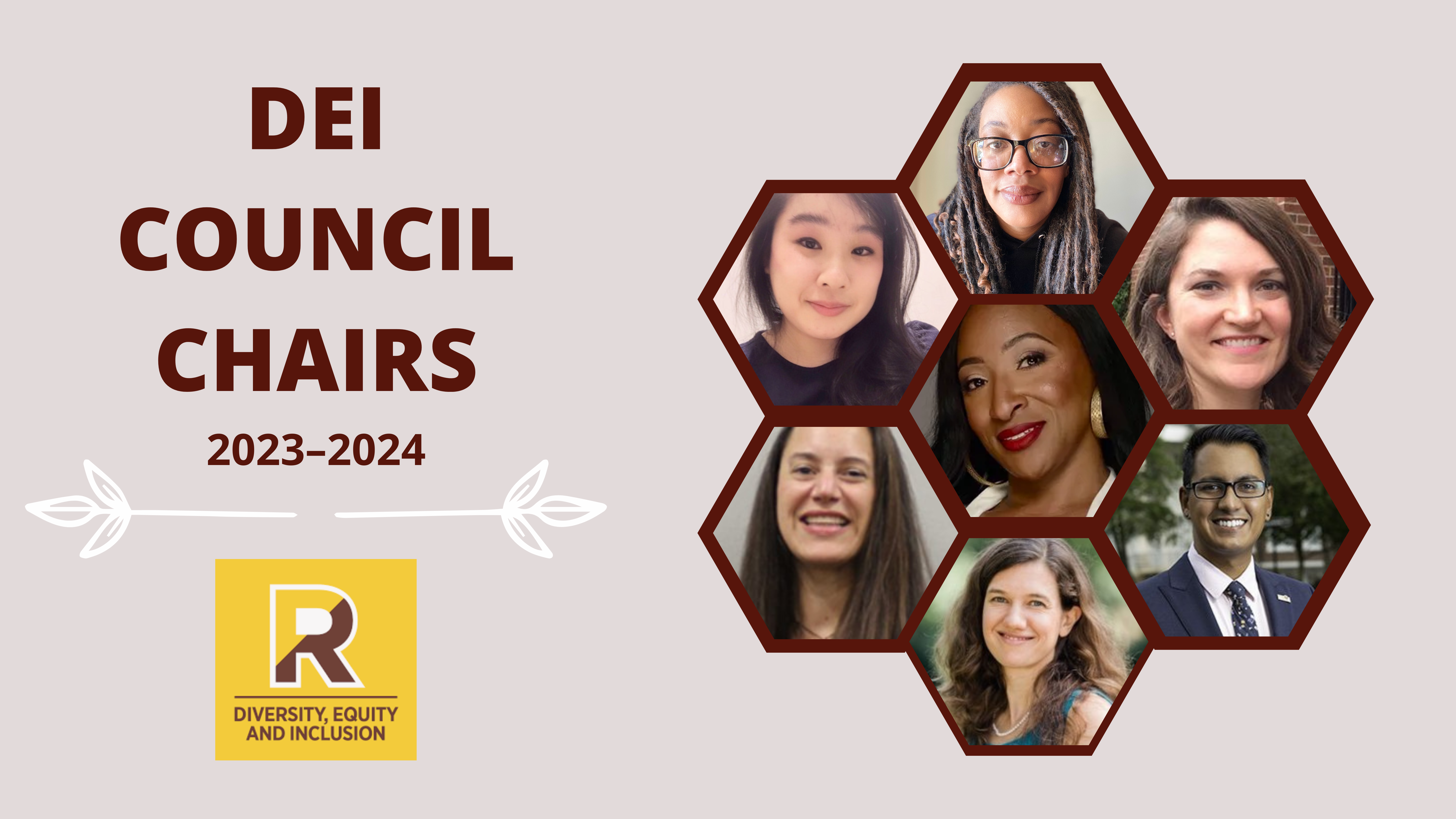
Image Alternative Text: Depicted are the Rowan University Diversity, Equity, and Inclusion (DEI) Council Chairs, with photographs arranged as a hexagon-shaped collage. Pictured clockwise from the top of the collage are Shante Walker, Dr. Amy Woodworth, Dr. Stephen Fleming, Dr. Andrea Baer, Dr. Shelly Thomas, Patricia Fortunato, and Dr. Kha' Sadler at the center of the collage.
The text to the left of the collage reads, "DEI Council Chairs" and "2023–2024." Flower stems, arranged horizontally, are depicted below the text. The Rowan University Division of DEI logo is positioned below the flower stems.
The Rowan University Diversity, Equity, and Inclusion (DEI) Council is responsible for leading in the development, implementation, and monitoring of the university's DEI Strategic Action Plan. Council members are comprised of leadership, staff, and faculty representatives from all academic units and departments under the university, as well as student leadership representatives. The council has three strategic priorities, led by seven dynamic leaders.
Learn more about these priorities, committee goals, and leadership below, and leave a message on the Division of DEI social media platforms!
Follow the Rowan University Division of DEI:
- Instagram: instagram.com/rowandei
- Facebook: facebook.com/rowandei
- X/Twitter: twitter.com/rowandei
- Threads: threads.net/@rowandei
Strategic Priorities Committee 1: Creating a More Inclusive and Equitable Campus Community
Committee Goals
DEI Content and Communications
- Manage a calendar of intercultural and inclusive observances shared across all colleges and schools under the university, for collaboration on educational and creative content development and strategic communications.
- Contribute content to the DEI website/blog, social media, and other DEI platforms and programming; and conduct outreach and foster collaborations with faculty, staff, and students across all colleges and schools under the university.
- Strategize university-wide surveys and other communications in alignment with DEI.
Empowering and Educating Faculty and Staff
- Identify opportunities for collaboration in DEI programming among colleges, schools, and departments under the university with overarching goals.
- Establish a DEI Ambassador program for faculty and staff who are interested in taking a more formal role in shifting campus culture.
Supporting Student Organizations
- Collaborate with the Student Government Association (SGA) and Office of Social Justice, Inclusion, and Conflict Resolution (SJICR) to address and better understand the challenges faced by SGA-sponsored and affinity organizations (recruitment, advisory, training, membership, financial support, etc.).
- Identify opportunities for collaboration among student organizations' overarching goals.
- Expand DEI training on cultural sensitivity and conflict resolution to student leaders who often experience difficult situations.
Dr. Stephen Fleming, DEI Council (SPC1) Co-Chair
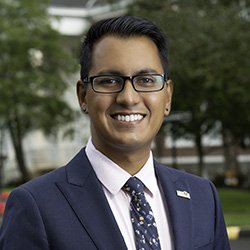
University Role: Associate Dean, College of Humanities and Social Sciences (CHSS) at Rowan University
Email: flemings@rowan.edu
Tell us about yourself:
I support the needs and programming for students in the College of Humanities and Social Sciences (CHSS). As part of my role, I prioritize the expansion of career development and experiential learning opportunities for liberal arts majors. Prior to working with CHSS, my experience was primarily in residence life and housing roles. I am an alumnus, having done my bachelor's and master's degrees at Rowan. I recently completed my Ed.D. in Higher Education at Temple University. In my free time, I enjoy trying new restaurants and training in a martial art called aikido which I also teach at the Rowan REC Center.
Why DEI work is important:
The benefits of higher education are numerous yet, a college education is not accessible and affordable for all. While Rowan has made commendable progress in creating a more diverse and equitable campus and supporting underrepresented populations, there is still work to do. DEI work is important because it raises awareness of disparities that exist in our work and intentionally strives to eradicate them. Moreover, in supporting the recruitment, retention, and graduation of underrepresented students, DEI work moves us closer to fulfilling the promise of higher education as an equalizer for all students.
Purpose of your committee:
The initial charge of our committee was to create a more inclusive and equitable campus community. The committee comprises members from various offices on campus that have a critical influence in this effort. To be more intentional and more focused in our charge, we've subdivided our committee into three subcommittees: content and communications, empowering faculty and staff, and supporting student organizations. Each subcommittee has specific goals outlined above.
Favorite DEI resources:
I most appreciate the various DEI lectures that are provided by the many units on campus, as they bring diversity and inclusion beyond race and often contextualize these issues in ways that most folks can understand. I also enjoy the programming offered by [the Office of Social Justice, Inclusion, and Conflict Resolution] SJICR. This office really provides a home for underrepresented students, and the quality and quantity of their programming is impressive.
Patricia Fortunato, DEI Council (SPC1) Co-Chair
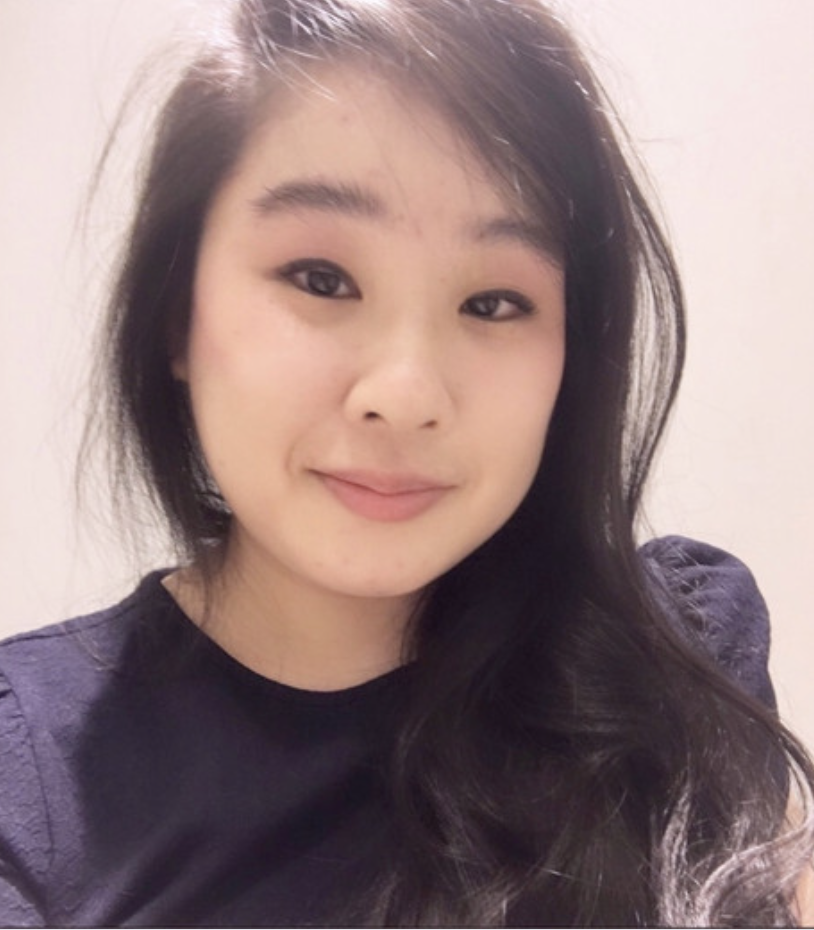
University Role: Diversity, Equity, and Inclusion Communications Coordinator, Division of DEI at Rowan University
Email: fortun83@rowan.edu
Tell us about yourself:
I've been working at Rowan University for five years, and I'm a proud alumna of the journalism program. From 2019 through 2023, I had the pleasure to serve as instructional designer, content manager, and program manager for our integrated pain management and addiction medicine institute under the founding physician chair, and in 2023, I earned experience as researcher and writer for psychiatry/mental health programming, all part of the osteopathic medical school. I've also earned experience as content manager for addiction medicine programming affiliated with the allopathic medical school. I've served as a co-chair on the DEI Council since 2021; as a subcommittee co-chair on the DEI Task Force since 2023; and in 2024, I joined the Division of DEI.
In 2019, I transitioned from my grounding in journalism/media and fundraising/development, to a critical opportunity at the osteopathic medical school focused on addressing the overdose crisis through clinical research funding/programming. It was through this work that I cultivated deeper empathy for all people living in pain and/or with addictions, and centered on the urgent need to eliminate disparities in social determinants of health (SDOH) and advance health equity for all marginalized groups. I'm forever grateful to have helped lead this work, which continues to drive a paradigm shift—that all people, including those living in pain and/or with other stigmatized conditions, are deserving of high-quality, evidence-based care grounded in safety, dignity, and respect. These humanistic experiences significantly shaped the professional, leader, and person I am today.
As I work with continued focus on DEI, I reflect on my foundational education and professional experience with sincere gratitude. I chose journalism because I was, and remain, curious about others' lives and motivations, and the methods and mediums that we utilize as researchers and communicators. I chose a career in higher education and academic medicine driven by healing, and a desire to drive equity, inclusion, and systemic and societal change. I continue in academia with a clear understanding of my why, and for that, I'm ever-grateful and eager to build on my experiences. I'm honored to work under the vision and mission of DEI at my alma mater, and as part of a dedicated team that leads with inclusion, compassion, understanding, and meaningful collaboration.
Why DEI work is important:
DEI work has the potential to challenge systemic and societal stigma and barriers that exist, pervade, and oppress in education, medicine, and communities. Curricula and educational content provides, in addition to inclusive pedagogical methods, opportunities for reflection on who we are as humans, our values, and how we can positively impact our communities. DEI work has the potential to inspire and motivate, towards recognition that caring about all living beings matters, while continually striving to better listen to and center all people with minoritized identities, resulting in driving change and developing meaningful opportunities and environments for everyone.
Finally, I recognize that all of us doing the work are working zealously towards positive change. Throughout the scope of my experiences, I've learned the criticality of passion and hope that inspires, and joy that results, from each step forward and tangible results. I've also learned the importance of being kind to myself and prioritizing my wellbeing. This past October, the Women's Alliance Network (WAN) hosted an event in honor of World Mental Health Day featuring Dr. Charryse Johnson, who delivered a profoundly inspiring speech. The biggest takeaway, from my perspective, was the value of fighting for peace. I believe that this reminder—to fight for peace—is good advice for all of us doing the work, and that making time for nurturing love and care cannot be overlooked.
Purpose of your committee:
The overall purpose of our committee is to create a more inclusive university community. We facilitate subcommittees dedicated to content and communications, empowering and educating faculty and staff, and supporting student-led organizations. As chair of content and communications efforts, I strive to cultivate inclusive and meaningful collaborations across all colleges and schools under the university, and mentor and amplify a growing network of contributors spanning students, staff, and faculty. As part of my role, I develop and administer content outlines and core defined references on educational topics; provide content strategy insight, writing, and design; and disseminate website/blog contributions via university-wide communications.
Favorite DEI resources:
I encourage all university professional staff and academic faculty to consider pursuing the Inclusive Pedagogy and Practices (IPP) Program offered by the Division of DEI. Curricula focuses on DEI in the context of neurodiversity understanding, and how to increase accessibility and inclusivity across campus and community settings. I was fortunate to have been a part of the second cohort in 2021, with a cumulative project focused on communication resources inclusive of neurodivergent people with substance use disorder (SUD)/addictions.
Other resources that I've found valuable, in no particular order, include:
Literature and Essays
- Ko, M., Ngo, V., Zhang, A. Y., Mabeza, R. M., & Hahn, M. (2024). Asian Americans and Racial Justice in Medicine. New England Journal of Medicine, 390(4), 372–378. (full PDF available via Dr. Oni Blackstock)
- Anderson, C. (2021). Understanding "Minority Stress" Saved My Life. Cognoscenti.
Books
- Barrett, D., & Lines, R. (Eds.). (2023). Towards Drug Policy Justice: Harm Reduction, Human Rights and Changing Drug Policy Contexts. Taylor & Francis.
- Piepzna-Samarasinha, L. L. (2018). Care Work: Dreaming Disability Justice. Arsenal Pulp Press.
Multimedia
- Tippett, K. (Host). (2023, April 13). Vivek Murthy: To Be a Healer. [Audio Podcast Episode]. In On Being.
- Crenshaw, K. (2016, October 7). The Urgency of Intersectionality. [Video]. Part of TEDWomen.
Dr. Kha' Sadler, DEI Council (SPC1) Co-Chair
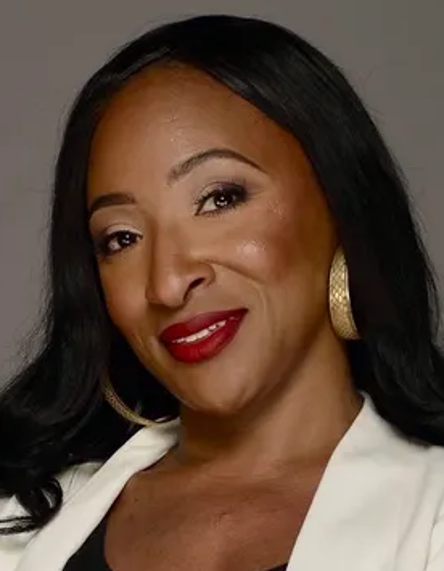
Pronouns: She, Her, Hers
University Role: Associate Provost for Wellness and Inclusivity and Mental Health Clinician at Rowan University
Email: sadlerk@rowan.edu
Tell us about yourself:
My name is Kha' Sadler, and by training, I am a mental health clinician who provides individual and group counseling and consultation. When called upon, I also serve faculty, staff, and student clubs/organizations by facilitating workshops on different and various topics related to the mental health of college students. I have been part of the Rowan community since 2013 as a doctoral intern at the Wellness Center. In 2014, I returned to the university in an interim position. Eventually, I accepted a full-time position as an assistant director/counselor and the mental health clinician in the [Achieving Success through Collaboration, Engagement, and Determination] ASCEND Program, formerly [the Educational Opportunity Fund/Maximizing Academic Potential] EOF/MAP.
I currently advise five multicultural organizations and am the co-advisor of another. My professional interests include racial and ethnic identity development, issues related to equity and inclusion, minority mental health, spirituality, first-generation and low-income student concerns, sexual trauma, dating relationship concerns, anxiety, and depression. My integrative theoretical orientation often includes psychodynamic, multicultural counseling, humanistic, solution focused, cognitive behavioral therapy [CBT], and dialectic behavioral therapy [DBT].
Given the impact and imprint that systems tend to leave on the minds of marginalized populations, it was paramount that I continued this work outside of Rowan University; therefore, in 2018, I created, developed, and founded a mental health program and consultation business titled: U Good F.A.M.? LLC (Fostering and Advancing Mental Health and Emotional Well-Being for Students of Color).
Since accepting an administrative position in 2023 within the Office of the Provost, my portfolio has expanded to diversify further well-being initiatives that include faculty, staff, and administrators. Institutions of higher education must develop communities of care to help ensure all of its members are thriving and flourishing. Extending and conceptualizing well-being and inclusivity initiatives campus-wide is rewarding, and I am honored to serve my campus community.
Why DEI work is important:
From a mental health perspective, we cannot speak about well-being without recognizing and acknowledging the relationship between DEI and the impact one's group membership has on the human mind.
Purpose of your committee:
Collaborate with the Student Government Association [SGA], and SGA chartered and unchartered affinity organizations to address and further understand institutional challenges often faced by affinity groups and develop tangible solutions to tackle their concerns.
Favorite DEI resources:
Here are a few I have found helpful that have also aided and informed my work as an administrator and mental health professional (no particular order and certainly not an exhaustive list):
- U Good F.A.M.? Education Sessions are offered to faculty, staff, and students at least once a semester, where mental health professionals from Rowan University or the community share their expertise on how to best work with students of color.
- Menakem, R. (2017). My Grandmother's Hands: Racialized Trauma and the Pathway to Mending Our Hearts and Bodies. Central Recovery Press.
- DeGruy, J. (2005). Post Traumatic Slave Syndrome: America's Legacy of Enduring Injury and Healing. Uptone Press.
- Walker, R. (2020). The Unapologetic Guide to Black Mental Health: Navigate an Unequal System, Learn Tools for Emotional Wellness, and Get the Help You Deserve. New Harbinger Publications.
- Faculty Center for Excellence in Teaching and Learning at Rowan University
- Faculty Guide to Supporting Student Mental Health, by the Jed Foundation
- The vast amount of programming offered to departments and student clubs/organizations throughout the academic year
Strategic Priorities Committee 2: Recruiting, Retaining, and Supporting a More Diverse Campus Community
In 2019, SPC2 developed a method for analyzing policies through an equity lens. The University Senate's Academic Policies and Procedures Committee and the Division of Academic Affairs have adopted the methodology as one of the tools they use when reviewing academic policies. At the request of DEI, SPC2 has documented some of the university's DEI issues and offered potential solutions. Members have begun working with colleagues throughout the university to realize some of these solutions, including the following items.
Committee Goals
Offer Solutions to DEI Issues Across Campus
- Expand the use of inclusive language practices in the classroom, throughout campus, and in our communications with prospective students and their families.
Prioritize Student Employment and Leadership Opportunities
- Reduce barriers to full participation in university opportunities such as on-campus employment, experiential learning, and student leadership.
Foster Scholarships and Funding
- Expand scholarship funding and revise its structure to better meet the needs of underrepresented student populations.
Strengthen Faculty–Student Mentorship
- Increase faculty involvement in student recruitment through outreach to minoritized communities.
Shante Walker, DEI Council (SPC2) Co-Chair
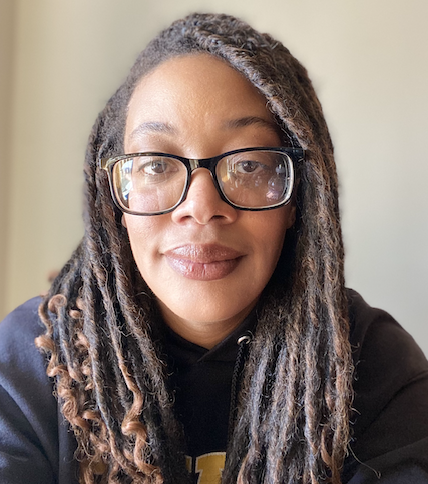
Pronouns: She, Her, Hers
University Role: Institutional Research Analyst, Office of Institutional Research and Analytics (OIRA) at Rowan University
Email: clarke18@rowan.edu
Tell us about yourself:
I am a part of a team in Rowan's Office of Institutional Research and Analytics (OIRA) which is responsible for tracking, submitting, and documenting all external submissions to state and federal accreditation agencies, and ranking profiles that the university participates in. I think of it as providing the data to the narrative told about Rowan University. Before working in OIRA, I was a data standards analyst for [Information Resources and Technology] IRT. This was a return to my Rowan roots, as I was once a student worker for IRT ASA [Analytics, Systems, and Applications] while completing my undergrad in Liberal Studies: Philosophy and Religion Studies track as a continuing education student.
Shortly after graduation, I accepted a temp position as program assistant with IRT and prior to my one-year contract ending, I entered my first full-time position at Rowan's College of Education as the assessment coordinator, maintaining the assessment system Tk20 (amongst many other things, lol). I worked in the College of Education from the summer of 2018 until mid-spring 2021 and will always be grateful for the lessons learned, friendships forged, and the experience of working in a student-facing academic environment. However, following the return to campus after COVID–19 closures, and the amount of turnover in positions directly affecting my job, I felt it was time for me to take my improved skill set back to IRT, and I happily accepted the data standards analyst role.
Outside of Rowan, I am a wife approaching my 20th wedding anniversary next April and the mother of three incredible humans and two elderly pitties who remain puppies in my eyes. In my free time, I run a Dungeon & Dragons campaign with my family, voluntarily watch YouTube lawyers streaming commentary on true crime court procedures, and have an unhealthy obsession with Sims 4 gaming.
Why DEI work is important:
"The paradox of education is precisely this—that as one begins to become conscious one begins to examine the society in which he is [they are] being educated." —James Baldwin, "A Talk to Teachers," October 16, 1963
Diversity, equity, and inclusion (DEI) work is critical in the higher education sector and important for several reasons. A diverse community enriches discussions and is essential for recentering marginalized voices, perspectives, and experiences. Equity work acknowledges the impact of systemic and structural oppression in our society, recognizing that some students and employees inherently face additional challenges when coming to campus. Ensuring inclusivity on campus requires an investigation into the sense of belonging and the standards necessary to ensure everyone in the Rowan community feels safe and valued, regardless of their background or identity.
Purpose of your committee:
I started my committee work a few years ago assisting SPC3 by providing a DEI assessment rubric in the Staff Hiring Toolkit. The following year, I saw a former colleague, Dr. Adrian Barnes, co-chairing SPC2, and recognized the opportunity to reconnect with my College of Ed co-workers while assisting with a recruiting toolkit. I provided resources and templates from comparable universities that have completed DEI recruiting programs and documentation.
During the summer and fall 2023 terms, a subset of SPC2 members volunteered to analyze and produce a report detailing results of the DEI Climate Survey for both student and employee populations. I look forward to communicating the results and receiving feedback on our findings with the larger SPC2 committee members sometime this spring.
As someone who views myself as a support specialist, I appreciate Adrian and Amy Woodworth's foresight in suggesting I co-chair this committee because I was truly shocked. I look forward to learning and contributing to DEI work on campus in a leadership position.
Favorite DEI resources:
Some of my favorite DEI data resources:
- Rowan University's Common Dashboards (and DEI Dashboard)
- Pew Research Center DEI Data
- "Democratizing data, for good." —data.org
Some of my favorite DEI storytellers and educators are found on TikTok:
- Andre Issac (@drdre4000) discusses diversity in curriculum, especially in STEM subject matter.
- Evan Mingo (@blacademics) series/playlist titled "Education is Liberation" and "Race and Sociology" are worth a watch.
- Jameelah Jones (@sunndaejones) whose tagline reads, "A Black lady using social media for social change"—her series on "Slavery in the US" provides several literary suggestions to delve deeper.
- Imani Barbarin (@crutches_and_spice) is a disability rights activist and social commentator on crisis management/PR.
- Amy Chen (@circusfaery33) video series, "Model Minority Myth," and "Voting"
- Evan Thornburg (@EVN the (Bio) Ethicist), on bioethics and the effects of mis/disinformation on society
Dr. Amy Woodworth, DEI Council (SPC2) Co-Chair
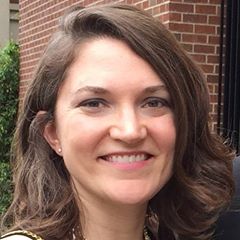
Pronouns: She, Her, Hers
University Role: Assistant Professor and Chair of the Department of Writing Arts at Rowan University
Email: woodworth@rowan.edu
Tell us about yourself:
During graduate school, I earned a certificate in Women's and Gender Studies, and in many ways I learned more in those classes (not just about gender, but race, class, sexuality, and disability) than the entire rest of my education. I've taught at multiple institutions—including Rutgers–Newark and Temple University—that serve diverse populations of students, and I respect and respond to the students in front of me each year. For six years, I directed Rowan's First-Year Writing Program and got a strong sense of the needs of incoming students; as part of my work, I ensured that our faculty got consistent access to professional development on mental health and on antiracist writing pedagogy. I'm excited to continue learning more about recruitment and retention both in my role co-chairing SPC2 and as the new chair of Writing Arts. Outside of Rowan, I like to cook and bike!
Why DEI work is important:
While higher education is becoming increasingly inclusive, it historically was structured around and built to support and maintain the power of a very limited set of people. Examining and challenging the aspects of higher ed that perpetuate inequities needs to be ongoing to make education accessible to everyone and, by extension, change the world around us for the better.
Purpose of your committee:
This committee takes a holistic approach to recruit and retain a diverse community, with a strong focus on supporting historically marginalized, underrepresented, and underserved students once they arrive at Rowan. In particular, we are working toward structural changes to keep students academically on track and to have a sense of belonging.
Favorite DEI resources:
While I, of course, love books and appreciate the reading groups offered through the Faculty Center and Division of DEI, I've found that social media is great for smaller, daily doses of content. Some Instagram accounts worth following are @splcenter, @colorofchange, @laylafsaad, @ibramxkendi, @democracynow, and @aclu_nationwide.
Strategic Priorities Committee 3: Promoting and Supporting Inclusive Teaching, Scholarship, and Professional Development
Committee Goals
Develop Best Practices Guide for Faculty and Staff Recruitment, Hiring, and Retention
- Develop a Faculty Hiring Toolkit as a guide for search committees that prioritizes DEI throughout the recruitment, hiring, and retention of minoritized faculty and staff at Rowan University.
Prioritize DEI in Faculty and Staff Annual Reviews
- Proposed, pending approval, DEI recommendations for memorandum of agreement (MOA) to ensure DEI work is being valued and rewarded as part of the professional responsibility of every faculty and staff member at Rowan University.
Advancing DEI Across Rowan University's Curriculum
- Explore recommendations for intercultural competence and diversity across the curriculum.
Dr. Andrea Baer, DEI Council (SPC3) Co-Chair
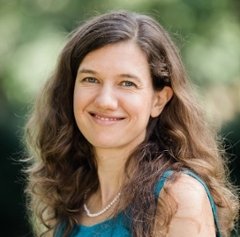
Pronouns: She, Her, Hers
University Role: Public Services Librarian/Assistant Professor for Campbell Library Teaching and Learning at Rowan University
Email: baera@rowan.edu
Tell us about yourself:
I joined Rowan University in 2019 as a public services librarian in Campbell Library on the Glassboro campus. In that role, I support students and faculty in critically engaging with and using library resources and other information sources, especially in the context of teaching, learning, and research. Appreciation of students' whole selves, inclusive and equitable pedagogical practices, and critical reflection are vital to that work. Having taught in a diverse range of educational contexts and worked in various types of academic institutions, I am also sensitive to the complex structural factors that influence both learning and work environments. I believe that fostering inclusive workplaces is essential to cultivating the conditions that support the wellbeing of both students and all members of a community.
I have been an academic librarian for over a decade and have written and presented extensively on information literacy. My research interests include critical and digital literacies, inclusive pedagogies, the intersections between information literacy and writing studies, affect and learning, critical reflective practice, and instruction librarians' teaching roles and practices.
Why DEI work is important:
In a cultural and historical moment of heightened polarization, we are also facing complex, existential, and "wicked problems" like growing social inequities, racial and structural violence, and climate change. I see critical inquiry, an ethics of care, and community building as vital to imagining and working toward a more just present and future. These values are at the center of true DEI work.
Purpose of your committee:
The full name of SPC3—Promoting and Supporting Inclusive Teaching, Scholarship, and Professional Development—of course describes a very large shared goal that all members of the Rowan community can ideally play a role in. How we go about that overarching goal depends a lot on our evolving context and on the needs and interests of the Rowan community. A few examples of how SPC3 has approached this work include facilitating the development of various resources for Rowan faculty and staff (for example, a Faculty Search Toolkit and an Inclusive Teaching Resource) and initiating the development of inclusive policies, such as the Preferred Name Policy.
Favorite DEI resources:
I will unashamedly promote the Inclusive Teaching Resource that SPC3 developed because it includes a wealth of valuable resources and tools for fostering inclusive learning environments. I hope that resources like the ones listed there provide inspiration and seeds for individual and collective reflection and action, as well as for further fostering community and an ethics of care in and beyond learning environments.
Dr. Shelly Thomas, DEI Council (SPC3) Co-Chair
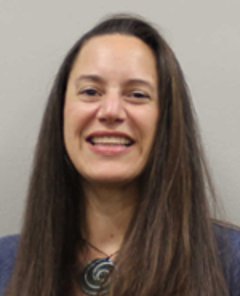
Pronouns: She, Her, Hers
University Role: Senior Lecturer, Department of Biological and Biomedical Sciences (BBS), College of Science and Mathematics (CSM) at Rowan University
Email: thomassh@rowan.edu
Tell us about yourself:
I started at Rowan in 2019. I serve on the Department of Biological and Biomedical Sciences (BBS) DEI Committee, where we have addressed issues such as equitable access and improving graduation rates of our BIPOC students. As the chair of both the BBS Seminar Committee and Student Professional Development Committee, I work to ensure access to workshops and representation in our BBS Seminar Series, and I introduced career seminars, encouraging our students to explore the wide range of jobs available to BBS majors. Furthermore, I introduced perspectives seminars, where speakers examine the effects of lack of diversity and equity in our biological fields as well as in our communities.
I teach courses in the ecology and conservation fields, and I have been pleased to each year include more human diversity topics into my classes; I am especially pleased with my restructuring of Environmental Science class to have a strong DEI theme running throughout the semester. I consider myself privileged to work with colleagues and students who are passionate about bringing positive change to Rowan's campus, our local communities, and the world.
Why DEI work is important:
While DEI work is important in all fields, I am passionate about the field of biology. Currently there is a vicious cycle of unequal access to education, lack of inclusiveness in hiring practices, discrimination in the workplace, and underrepresentation in many scientific careers. Climate change has a disproportionate impact on countries dominated by people of color, despite the fact that these countries release a much lower proportion of greenhouse gases. The cumulative effects of environmental racism damages generations of communities. The long history of racism, sexism, genderism, etc. in the medical field has far-ranging impacts on the training of new experts, research, and the treatment of patients.
The examples sometimes feel innumerable and overwhelming. However, there is good news. Our actions as researchers, educators, scientists, medical practitioners, and community activists are building momentum to overcome these challenges. The more we increase the diversity of our scientific community, the more we are able to work together to solve problems and bring systemic change.
Favorite DEI resources:
- Antiracist Pedagogy and Practices (APP) Program at Rowan University
- Perspective Seminars from the Department of Biological and Biomedical Sciences (BBS) at Rowan University
- Diversity and Inclusion Seminar Series from the Society for the Advancement of Biology Education Research (SABER)
- Schell, C. J., Dyson, K., Fuentes, T. L., Des Roches, S., Harris, N. C., Miller, D. S., ... & Lambert, M. R. (2020).
- The Ecological and Evolutionary Consequences of Systemic Racism in Urban Environments. Science, 369(6510), eaay4497.
- Schell, C. J., Guy, C., Shelton, D. S., Campbell-Staton, S. C., Sealey, B. A., Lee, D. N., & Harris, N. C. (2020). Recreating Wakanda by Promoting Black Excellence in Ecology and Evolution. Nature Ecology & Evolution, 4(10), 1285-1287.
- Tseng, M., El-Sabaawi, R. W., Kantar, M. B., Pantel, J. H., Srivastava, D. S., & Ware, J. L. (2020). Strategies and Support for Black, Indigenous, and People of Colour in Ecology and Evolutionary Biology. Nature Ecology & Evolution, 4(10), 1288-1290.
- Harriet Washington’s books, Medical Apartheid (explores the history of medical experimentation on African Americans) and A Terrible Thing to Waste: Environmental Racism and Its Assault on the American Mind (the damaging effects of many pollutants as well as other activities that disproportionately affect people of color)